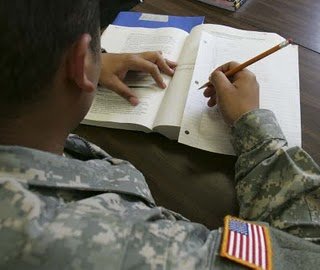 Career servicemen and women might not make use of GI Bill benefits offered by the military but some of them can convert years of service into the gift of education for their spouses or children.
Career servicemen and women might not make use of GI Bill benefits offered by the military but some of them can convert years of service into the gift of education for their spouses or children.
Through the Post-9/11 GI Bill, men and women who provided active duty minimums on or after the Sept. 11, 2001 terrorist attacks receive tuition and fees for degree and vocational programs as well as housing and book and supply allowances. And eligible bill beneficiaries who have served, or commit to serve, 10 years or more of active duty, can pass all or part of this assistance on to their dependents, according to information on the Department of Defense Web site.
The Post-9/11 GI Bill provides eligible participants as much as the highest tuition and required fees that residents pay to attend a college or university in the state where those residents live, according to the U.S. Department of Veterans Affairs. Service members, other than those who are disabled, must provide at least 36 months of active duty to receive that highest rate, Veterans Affairs notes. The average in-state tuition at four-year public institutions for the 2009-2010 academic year was $7,020, according to published rates provided by the New York City-based College Board.
To be eligible for this special VA education benefit, you must be a member of the Armed Forces (active duty or Selected Reserve, officer or enlisted) on or after August 1, 2009, eligible for the Post-9/11 GI Bill, and: have at least six years of service in the Armed Forces on the date of election and agree to serve four additional years; or, have at least ten years of service in the Armed Forces on the date of election, but you are precluded by either standard policy (service or DoD) or statute from committing to four additional years (you must agree to serve for the maximum amount of time allowed by such policy or statute); or, you become retirement eligible during the period from August 1, 2009, through August 1, 2013.
Additional active duty service may or may not be required. There are several facets to the TEB program, and many military links to find further details. Please visit the official DoD website for more information about TEB benefits and service commitment requirements: GI Transferability Has Arrived.
The transfer program is open to those who provided at least six years of service on or after Aug. 1, 2009 and agree to put in another four years; those who have served 10 years by Aug. 1, 2009 and cannot, by law or regulation, commit to four more years but can provide additional service; and those eligible, but not approved, for retirement after Aug. 1, 2009 and by July 31, 2012 who provide one to three additional years of service, Department of Defense information shows.
If you were eligible for retirement as of Aug. 1, 2009 or approved for retirement after Aug. 1, 2009 and before July 1, 2010, you can make use of the program without any additional commitment, according to Department of Defense information.
Spouses may start to use the benefit immediately, and may use the benefit while you remain in the Armed Forces or after separation from active duty. Spouses are not eligible for the monthly stipend or books and supplies stipend while you serve on active duty, but they can use the benefit for up to 15 years after your last separation from active duty.
Sons and daughters, on the other hand, receive monthly housing, books and supplies allowances as well as tuition and fees. But they can’t make use of any Post-9/11 education benefits until they are ages 18 to 26 with high school diplomas or equivalency certificates and you have fulfilled at least 10 years of Armed Forces service, according to Veterans Affairs. To receive the transferred benefits, any and all dependents must be enrolled in what’s known as a Defense Eligibility Enrollment Reporting System that determines whether or not they qualify, the Department of Defense notes.
Veterans Affairs recommends that interested service members visit the Department of Defense’s Transferability Application Web site to determine whether their dependents can participate in the program.
Education Connection helps students find accredited campus and online college programs that are best suited to their individual needs and goals as well as the money to help pay for them. The service, which is free for students, has to date matched more than 2 million people with its accredited partner institutions. Education Connection’s online ‚”Money for College” Finance Center provides detailed information about scholarships and grants, education-related tax credits, military benefits, federal and private student loans and loan consolidation.
For more information, Visit Our Education Center
ATTENTION READERS
We See The World From All Sides and Want YOU To Be Fully InformedIn fact, intentional disinformation is a disgraceful scourge in media today. So to assuage any possible errant incorrect information posted herein, we strongly encourage you to seek corroboration from other non-VT sources before forming an educated opinion.
About VT - Policies & Disclosures - Comment Policy



